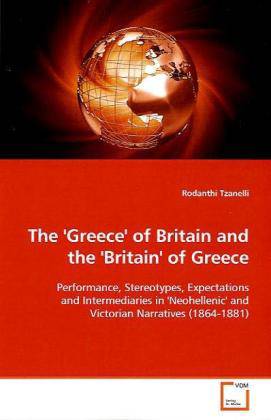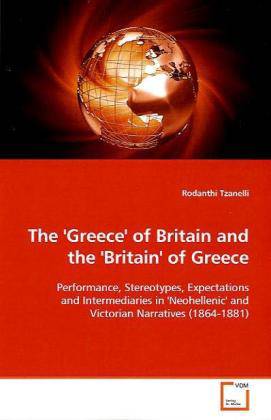
- Afhalen na 1 uur in een winkel met voorraad
- Gratis thuislevering in België vanaf € 30
- Ruim aanbod met 7 miljoen producten
- Afhalen na 1 uur in een winkel met voorraad
- Gratis thuislevering in België vanaf € 30
- Ruim aanbod met 7 miljoen producten
Zoeken
The 'Greece' of Britain and the 'Britain' of Greece
Performance, Stereotypes, Expectations and Intermediaries in 'Neohellenic' and Victorian Narratives (1864-1881)
Rodanthi Tzanelli
Paperback | Engels
€ 77,95
+ 155 punten
Omschrijving
The role Western philhellenism played in the
production of modern Greek identity has been the
object of extensive research. Scholars focused on the
importance Hellenic culture acquired in European
discourses of modernity and the maintenance of
national and imperial self-images in the West. The
present book re-conceptualises the historical
emergence of such discursive frameworks as gatekeepers of hegemonic and counter-hegemonic
projects. The specific context it explores is that of
Anglo-Greek cultural exchange in the third quarter of
the nineteenth century (1864-1881). It is argued that
Greece s ambiguous attitude toward British demands
for Greek modernisation, and British frustration
originating in modern Greek irredentism and internal
disorder, define the frame of resistance. Constant
miscommunication between Greeks and
Britons made co-operation impossible and assisted in
the production of Greek counter-hegemony. The
specific path of Greek modernisation, state, and
nation-formation was developed in several key
political/discursive conflicts around: (i) Crime and
disorder, (ii) the rationalisation of historical
past, and (iii) the nationalist project of the Great
Idea .
production of modern Greek identity has been the
object of extensive research. Scholars focused on the
importance Hellenic culture acquired in European
discourses of modernity and the maintenance of
national and imperial self-images in the West. The
present book re-conceptualises the historical
emergence of such discursive frameworks as gatekeepers of hegemonic and counter-hegemonic
projects. The specific context it explores is that of
Anglo-Greek cultural exchange in the third quarter of
the nineteenth century (1864-1881). It is argued that
Greece s ambiguous attitude toward British demands
for Greek modernisation, and British frustration
originating in modern Greek irredentism and internal
disorder, define the frame of resistance. Constant
miscommunication between Greeks and
Britons made co-operation impossible and assisted in
the production of Greek counter-hegemony. The
specific path of Greek modernisation, state, and
nation-formation was developed in several key
political/discursive conflicts around: (i) Crime and
disorder, (ii) the rationalisation of historical
past, and (iii) the nationalist project of the Great
Idea .
Specificaties
Betrokkenen
- Auteur(s):
- Uitgeverij:
Inhoud
- Aantal bladzijden:
- 276
- Taal:
- Engels
Eigenschappen
- Productcode (EAN):
- 9783639115994
- Uitvoering:
- Paperback

Alleen bij Standaard Boekhandel
+ 155 punten op je klantenkaart van Standaard Boekhandel
Beoordelingen
We publiceren alleen reviews die voldoen aan de voorwaarden voor reviews. Bekijk onze voorwaarden voor reviews.











